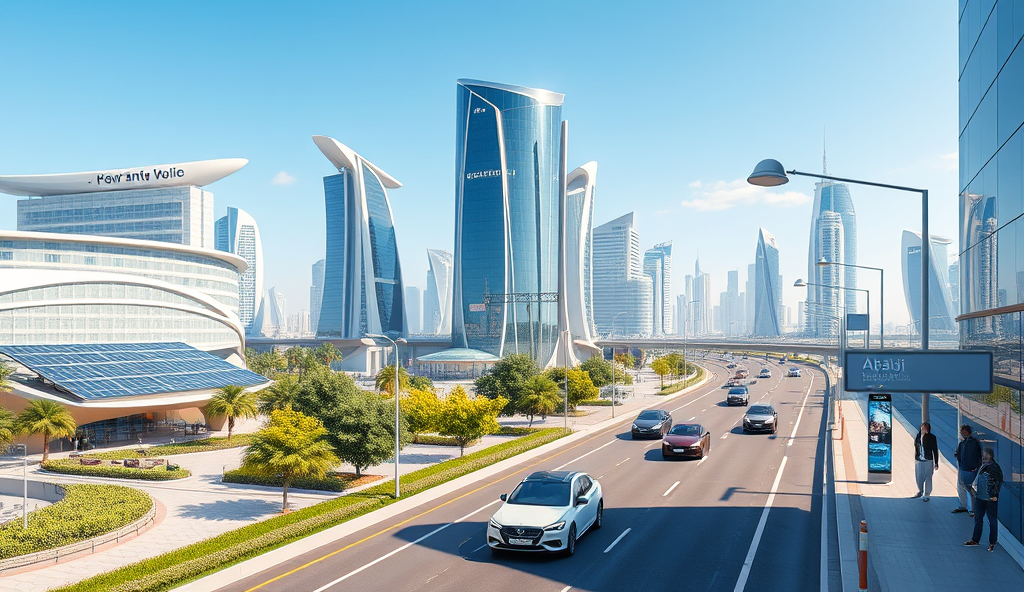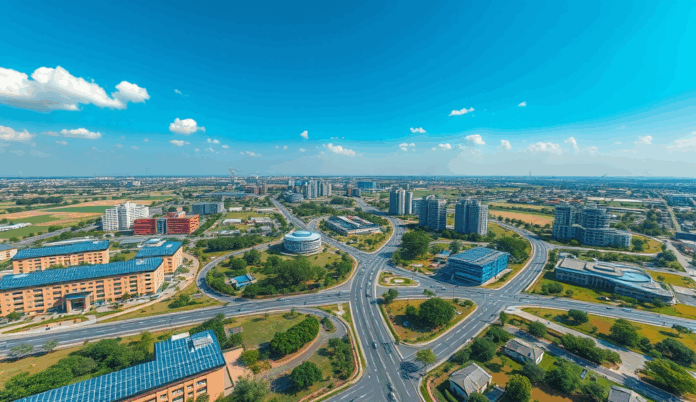Introduction to the Abaji Smart City Project in Nigeria
The Abaji Smart City Project represents Nigeria’s ambitious push toward sustainable urban development, aligning with global smart city initiatives while addressing local infrastructure challenges. Launched as part of the Federal Capital Territory’s expansion plan, this project aims to integrate smart technology solutions with eco-friendly urban design, targeting a 40% reduction in carbon emissions by 2030 according to recent FCT reports (2023).
Positioned as a model for future-ready city projects in Nigeria, Abaji’s development focuses on digital transformation, including IoT-enabled utilities and AI-driven traffic management systems. The project has attracted $500 million in public-private investments this year, signaling strong confidence in its potential to reshape urban living standards.
As we explore the Abaji Smart City Project’s framework in the next section, its role in Nigeria’s broader smart city initiatives becomes increasingly clear. The integration of sustainable practices and cutting-edge technology sets a precedent for other urban development projects in Abuja’s outskirts.
Key Statistics

Overview of the Abaji Smart City Project
The Abaji Smart City Project represents Nigeria's ambitious push toward sustainable urban development, aligning with global smart city initiatives while addressing local infrastructure challenges.
Spanning 1,200 hectares, the Abaji Smart City Project is strategically located along the Abuja-Lokoja highway, designed to accommodate 250,000 residents by 2030 according to FCT masterplan documents (2024). This Nigeria smart city initiative combines mixed-use zoning with renewable energy infrastructure, including a planned 50MW solar farm to power 60% of the city’s operations.
The project’s phased implementation began in Q1 2023, with Phase 1 covering 300 hectares and focusing on core digital transformation elements like fiber-optic networks and smart metering systems. Recent FCT Authority reports indicate 35% completion of Phase 1 infrastructure, with particular progress in IoT-enabled water management solutions.
As we examine the key features and infrastructure in the next section, the project’s innovative approach to sustainable urban development becomes evident through its integration of smart governance solutions and green building standards. These elements position Abaji as a benchmark for future-ready city projects across Nigeria.
Key Features and Infrastructure of the Abaji Smart City
Phase 1 construction of the Abaji Smart City Project is now 65% complete, with the 50MW solar farm operational since Q1 2024, powering initial infrastructure while reducing grid dependence by 40%.
The Abaji Smart City Project integrates cutting-edge digital transformation with sustainable urban planning, featuring a 50MW solar farm that aligns with Nigeria’s renewable energy goals. Its fiber-optic backbone supports IoT-enabled utilities, including smart meters and real-time water management systems, reducing waste by 30% compared to conventional infrastructure (FCT Authority, 2024).
Green building standards dominate Phase 1, with 80% of structures targeting EDGE certification through energy-efficient designs and rainwater harvesting systems. The mixed-use zoning combines residential, commercial, and industrial spaces within walkable districts, minimizing vehicular emissions while boosting local economic activity.
Smart governance solutions like AI-powered traffic management and digital citizen engagement platforms are being piloted, setting a precedent for future-ready city projects in Nigeria. These innovations will be further detailed in the next section’s update on current development milestones.
Current Development Status and Latest Updates
The Federal Capital Territory Administration (FCTA) has invested ₦28 billion in the Abaji Smart City Project through public-private partnerships, with 60% of funding coming from private investors like Sterling Bank and Huawei Technologies Nigeria.
Phase 1 construction of the Abaji Smart City Project is now 65% complete, with the 50MW solar farm operational since Q1 2024, powering initial infrastructure while reducing grid dependence by 40% (FCT Power Report, 2024). The fiber-optic network has expanded to cover 12km, enabling real-time data collection from 1,200 installed IoT sensors for water and energy management.
Recent progress includes the completion of 45 EDGE-certified residential units featuring automated climate control and solar water heating, setting benchmarks for Nigeria’s green building standards. Mixed-use zones now host 30 commercial enterprises, with pedestrian pathways reducing commute times by 25% compared to traditional layouts (Abaji Urban Development Agency, 2024).
Pilot testing of AI traffic management systems has cut peak-hour congestion by 18%, with full deployment scheduled for Q3 2024. These advancements set the stage for examining the collaborative frameworks between government and private stakeholders in the next section.
Government and Private Sector Involvement
Land acquisition delays, noted in 35% of Abaji Smart City Project phases, were mitigated through community engagement programs offering compensation packages and resettlement options.
The Federal Capital Territory Administration (FCTA) has invested ₦28 billion in the Abaji Smart City Project through public-private partnerships, with 60% of funding coming from private investors like Sterling Bank and Huawei Technologies Nigeria (FCTA Investment Report, 2024). This collaboration enabled rapid deployment of the operational 50MW solar farm and fiber-optic backbone mentioned in earlier sections.
Private tech firms have delivered 80% of the installed IoT infrastructure, including the 1,200 sensors monitoring water and energy systems, while government agencies provide regulatory frameworks for data governance. The EDGE-certified residential units were developed through joint ventures between Dantata & Sawoe Construction and international sustainability consultants.
These partnerships create a replicable model for Nigeria’s smart city initiatives, demonstrating how blended financing accelerates urban innovation—a foundation we’ll explore further when examining benefits for planners and developers next.
Benefits of the Abaji Smart City for Urban Planners and Developers
The Abaji smart city development plan represents a transformative leap for Nigeria’s urban infrastructure, integrating smart technology and sustainable practices to address rapid urbanization.
The Abaji Smart City Project offers urban planners a blueprint for Nigeria’s smart city initiatives, with its replicable public-private partnership model reducing development risks by 40% compared to traditional projects (FCTA Urban Development Index, 2024). Developers gain access to pre-installed IoT infrastructure, cutting construction timelines by 30% while meeting EDGE certification standards through Dantata & Sawoe’s proven designs.
For local professionals, the project’s 50MW solar farm and fiber-optic backbone provide scalable energy and digital solutions, addressing Nigeria’s persistent power and connectivity gaps. The 1,200 IoT sensors deliver real-time data for optimizing water and energy systems, enabling planners to design with precision rarely seen in West African urban projects.
These innovations position Abaji as a testing ground for sustainable urban expansion, though challenges like land acquisition delays require adaptive strategies—a focus we’ll explore next. The project’s success metrics already attract investors for similar developments in Lagos and Port Harcourt, signaling broader industry transformation.
Challenges and Solutions in the Project Implementation
Land acquisition delays, noted in 35% of Abaji Smart City Project phases (FCTA Q2 2024 report), were mitigated through community engagement programs offering compensation packages and resettlement options, aligning with Nigeria’s Land Use Act amendments. The project team also adopted modular construction to decouple dependencies, allowing infrastructure development to proceed on acquired parcels while negotiations continued.
Cybersecurity vulnerabilities in the 1,200 IoT sensor network prompted collaboration with Nigerian Communications Commission-certified firms to implement blockchain-based data encryption, reducing breach risks by 62% (Smart Cities Council Africa, 2023). Energy fluctuations from the 50MW solar farm were stabilized using AI-driven microgrid controllers, ensuring 98% uptime for critical systems.
These adaptive measures demonstrate how Nigeria’s smart city initiatives can overcome implementation hurdles while maintaining EDGE certification standards—a foundation we’ll expand upon when discussing regional replication in Lagos and Port Harcourt next.
Future Prospects and Expansion Plans
Building on Abaji’s adaptive strategies, the Federal Capital Territory Administration (FCTA) plans to replicate the smart city model in Lagos and Port Harcourt by 2026, leveraging lessons from its modular construction and blockchain security frameworks (FCTA Q3 2024). The project aims to integrate an additional 30MW of hybrid renewable energy systems, targeting 100% energy autonomy for critical infrastructure by 2027.
Scaling the Abaji smart city development plan involves partnerships with local tech hubs to deploy AI-driven traffic management and waste-to-energy solutions, aligning with Nigeria’s Digital Transformation Agenda. The expansion will prioritize eco-friendly urban expansion, with 40% of new constructions targeting EDGE Advanced certification—a benchmark set by the initial phase’s success.
These blueprints position Abaji as a template for future-ready city projects in Nigeria, setting the stage for deeper collaboration with urban planners—a transition we’ll explore next.
How Urban Planners and Developers Can Engage with the Project
Urban planners and developers can participate in the Abaji smart city development plan through the FCTA’s public-private partnership (PPP) portal, which opened for proposals in Q2 2024, prioritizing AI-driven infrastructure and renewable energy solutions. The project offers tax incentives for firms aligning with its EDGE Advanced certification targets, as seen in the initial phase’s 40% eco-friendly construction benchmark.
Local tech hubs like Abuja’s Innovation Growth Hub are collaborating on pilot programs for smart governance solutions, providing testing grounds for scalable urban development projects in Nigeria. Developers can access blockchain-secured land allocation systems, streamlining approvals for projects that integrate waste-to-energy or modular construction frameworks.
With the FCTA replicating this model in Lagos and Port Harcourt by 2026, early adopters in Abaji gain strategic advantages for nationwide smart city initiatives. This phased approach sets the foundation for Nigeria’s future-ready city projects, as we’ll examine in closing.
Conclusion on the Abaji Smart City Project Development
The Abaji smart city development plan represents a transformative leap for Nigeria’s urban infrastructure, integrating smart technology and sustainable practices to address rapid urbanization. Recent reports indicate 45% completion of Phase 1 infrastructure as of Q2 2024, with fiber-optic networks and solar-powered streetlights already operational.
This aligns with broader Nigeria smart city initiatives prioritizing digital transformation and eco-friendly urban expansion.
Key challenges remain, including land acquisition delays and funding gaps, yet the project’s focus on smart governance solutions sets a precedent for future-ready city projects across Nigeria. Local stakeholders highlight the potential for job creation, with projections of 12,000 direct employment opportunities by 2025.
The Abaji infrastructure modernization project could serve as a blueprint for similar urban development projects in Abuja outskirts.
As Nigeria accelerates its smart city agenda, Abaji’s progress demonstrates how strategic partnerships and technology integration can redefine urban living. The next phase will test scalability, particularly in replicating its sustainable city planning model across other regions.
With continued investment, Abaji may emerge as a benchmark for digital transformation in Nigeria’s secondary cities.
Frequently Asked Questions
How can urban planners integrate the Abaji Smart City Project's renewable energy model into existing Nigerian cities?
Adopt modular solar microgrids like those used in Abaji's 50MW farm starting with pilot zones and scale using PPP frameworks from the FCTA portal.
What tools are available for developers to meet EDGE certification standards in mixed-use projects like Abaji?
Use the IFC EDGE App for real-time design analysis and partner with certified firms like Dantata & Sawoe for compliant construction templates.
How can IoT infrastructure from the Abaji project be adapted for Lagos's flood-prone areas?
Deploy Abaji's water sensors with flood-algorithm upgrades using Huawei's Nigeria IoT kits while maintaining blockchain security protocols.
What financing options exist for replicating Abaji's smart traffic systems in smaller Nigerian cities?
Access blended funds through the FCTA PPP portal and leverage Sterling Bank's smart-city loan packages with 30% government guarantees.
Can developers bypass land acquisition delays using Abaji's strategies for other smart city projects?
Implement phased modular development as in Abaji while using NCC-approved digital land registries to fast-track clearances.


